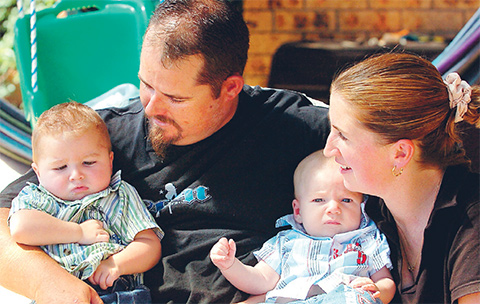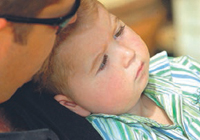Cody in the News

LIVING IN HOPE: Cody Sheppard, 2, at home in Richardson with his father Darren, mother Sonia and younger brother Ben, 4 months. Cody has a rare brain disease called cerebellar hypoplasia. Picture:RICHARD BRIGGS
One step at a time for young Cody as he battles on
By Emma Tinkler
Cody Sheppard should be running around the backyard, gabbling incessantly and getting into mischief. Instead, the blond, blue-eyed almost-two-year-old strains against his father’s chest, his fists clenched as he struggles to breathe.
Cody has cerebellar hypoplasia, a rare developmental disorder stemming from the incomplete formation of the cerebellum—the part of the brain that controls motor and sensory functions. He also has cerebral palsy.
Children with cerebellar hypoplasia, or CH, are affected both mentally and physically, with symptoms including mental retardation, hearing and sight impairment, feeding and breathing difficulties and an inability to coordinate muscle movements.
Cody has not yet reached any of the milestones that other toddlers accomplish—he cannot walk or even crawl, talk or sit up by himself. He is not yet eating solid food, suffers terrible seizures and is at least partially blind.
“You feel like giving up a lot. But we wouldn't give him up for anything. We love him to death.”
Caring for him has been ‘‘hell’’, according to his parents Sonia and Darren Sheppard, of Richardson, with dozens of visits to hospital, a long list of specialists to see each week and little sleep as they try to comfort him when he wakes up in inexplicable pain during the night.
The rarity of the condition means there are few people who understand what they are going through—so far the couple has located only a handful of other families with CH children in Australia. ‘‘I still look up and wonder, ‘What did I do wrong to deserve this?’ ’’, Mr Sheppard said. ‘‘You feel like giving up a lot. But we wouldn’t give him up for anything. We love him to death.’’
The Sheppards are hoping that Cody will soon be ready to use a Hart Walker, which will give him some mobility and help him learn to walk. But it’s not cheap — the walker costs about $16,000, and is just one of the many expenses the family must endure to help their little boy have the best quality of life.
Without much government assistance and relying on just one income, they are hoping the community can pitch in. The Sheppards and a small band of family and friends have established the ACT Cerebellar Hypoplasia Support Network, which aims to improve the understanding of the disorder within the community and to provide a supportive and collaborative network for families affected by the condition.
At the end of the month the network will host a trivia night to raise funds for Cody’s walker. ‘‘Cody has had such a big impact on everyone’s life, our family and friends,’’ Mrs Sheppard said. ‘‘He has to take four steps to prepare him for the Hart Walker. You never know, one day he might be able to walk independently—but it’s doubtful.’’
Cody has been showing some signs of improvement since the birth of his brother, Benjamin, in November, and the family hope the younger son will spur his sibling on. But they remain cautious about hoping for too much in the future. ‘‘It’s a bit hard to look too far ahead,’’ Mrs Sheppard said. ‘‘They say he has a normal life span, but you don’t know.’’
The trivia night will be held at the Italo-Australia Club on Friday, March 31 2006. Tickets are $10 each or $90 for a table of 10. For tickets, call Kath Kearins on 0408 866 871 or Dearne McCreath on 0421 617 844.
Published in the Canberra Times, March 6, 2006
Little Cody captures a community’s heart
by Emma Tinkler
 Generous Canberrans have swamped the family of Cody Sheppard with money donations and offers of support after an appeal was made to help buy the disabled toddler a special walker.
Generous Canberrans have swamped the family of Cody Sheppard with money donations and offers of support after an appeal was made to help buy the disabled toddler a special walker.
Cody, aged almost two, was born with cerebellar hypoplasia, a rare developmental disorder stemming from the incomplete formation of the cerebellum — the part of the brain that controls motor and sensory functions. He also has cerebral palsy.
Children with cerebellar hypoplasia, or CH, are affected mentally and physically, having symptoms including mental retardation, hearing and sight impairment, feeding and breathing difficulties and an inability to coordinate muscle movements. As a result of his condition, Cody has not yet reached any of the milestones that other toddlers accomplish — he cannot walk or crawl, talk or sit up by himself.
The Canberra Times reported on Monday that Cody would soon be ready to use a special walker, which would give him some mobility and help him learn to take his first steps. However, the walker costs about $16,000, and in the absence of much government assistance his parents, Darren and Sonia Sheppard, of Richardson, had hoped the community would pitch in to help their boy.
‘‘We had another email from a lady in America, and she wanted to donate some money as well. It’s all very overwhelming.’’
Mrs Sheppard said yesterday that the story had prompted an outpouring of generosity, and many offers of help and donations of money. ‘‘I’ve had six cheques in the mail of $100 each from people in the community who read The Canberra Times article,’’ she said.
‘‘We had another email from a lady in America, and she wanted to donate some money as well. ‘‘It’s all very overwhelming.’’
Cody’s family and friends have organised a trivia night at the end of March to raise more funds. The event was now completely booked out, Mrs Sheppard said. Several businesses and the community Lions Club had donated prizes for the event, and a Canberra radio station had been urging yet more people to give prizes or help.
The family had also been contacted by the CPS credit union, which was preparing an appeal for Cody among its 4000 staff.
The Sheppards have also been told that Cody may not require the most expensive walker, but another type that would cost about $6200. The family would send out a letter to all businesses and others who had donated so far to inform them of the change in cost, and to let them know that any remaining funds raised would be put toward making their home more userfriendly for their boy.
Mrs Sheppard said they were very grateful to all those who had heeded their call for support. ‘‘It’s already had a huge impact on all of us,’’ she said.